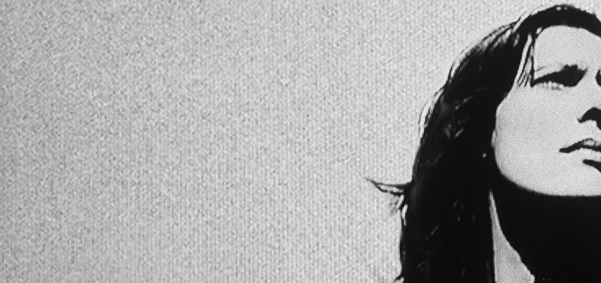Since her departure from the hallowed Stereolab, lead singer Laetitia Sadier has made two solo albums, counting her current release, Silencio. And this LP has a lot to say. It interrupts the noise of chatter about commercialism. It interrupts our complacency over the fiscal and social systems that keep us exploited. It reminds us that our first loyalty must be to knowing ourselves, that we must love ourselves before we can love others, before we can fight the hate of the Other that is impressed so strongly upon us.
Though Sadier’s deeply-held beliefs, which prove that the personal is political (and vice versa), and her ethereal vocals are front and centre on Silencio, the record was not made alone. Nor was it made in silence. Former Stereloab comrade Tim Gane appears, and there are two songs written by James Elkington, and there is a cameo by Sam Prekop.
The songs, delivered both in French and English, span the aforementioned personal (a song about Sadier’s mother) and the political (a song about the problems inherent in consumerism). The album culminates in a bilingual spoken word piece, ‘Invitation au Silence’, which broadcasts not only the purity of Sadier’s voice, but gives power to the minute of silence that features at the end of the piece.
Are you playing a show tonight
Laetitia Sadier: I’m going to participate in a little fund-raising event for The Cinema Museum in London. I had to work out a song from a movie of my choice, so I picked the Rosemary’s Baby theme. I found the chords. I’m very happy.
I’m sure that’ll be great.
LS: It’s a nice song. It’s really haunting.
That sounds like an interesting fundraiser.
LS: They have no subsidies or anything. It really is a cinema museum in the sense that it’s really old cinema, really early cinema, up until the ’70s, which really costs a fortune to keep going. It’s a beautiful space as well, a very unexpected space. My friend Marie helps run it. She used to be in Monade with me, so I’m doing it to help her.
You mentioned Monade and, of course, Stereolab, and I was wondering how you feel like your writing process has changed and developed since you’ve been in those bands.
LS: I wrote songs in my dreams… I would dream about songs. And then I would actually write songs somehow, and I would think, ‘Oh, it’s a miracle.’ I decided to record with [other] people, and I had one week to write four songs. I was very inspired because of the people I’d met, who were my French musical family. I was very excited to meet them and record with them.
It was very short notice and suddenly I had to write quickly and on demand. So I realized, well, okay, I can do that now. I can write on demand. I would like to have a slower process of writing, but the last album was recorded also on demand because there was that pressure, and I had to record in this time because I booked this time. I had deadlines, and this is what I needed, but I don’t want to do it like that. I find myself with the safety net of what I know already, and I would really like to fly freely and not be scared of how or where I land.
I’m still reverting back to how I know to do things already. For The Trip, I thought I would break away from that and I didn’t completely. And for this one, I found myself, because I had this time pressure, reverting back to some kind of more secure approach, which is hard to break. I’m determined however, for the next potential album, to work more regularly throughout time, and not be in a position where I have to write. I feel I need to dive deeper.

How do you decide if a song is going to be in French or in English?
LS: There’s no real rule. I’ve decided on this next album to write more in English than in French because where I travel, people are more likely to speak English than to speak French. But there’s a song about my mother, which is in French. And there’s a song about a time in Paris with a friend, and that’s in French. I don’t think it really matters. Do you think it matters?
I do listen to lyrics because I like to know what a song is about. But if a song is a good song, it holds up no matter what language it’s in.
LS: I could say that some of the more intimate things can be in French, like the song relating to my mother, but there’s also some strongly personal things I’ve written in English. But it doesn’t speak to that rule.
When you write with someone else, like I know you wrote with James Elkington for this record, how does it work? Do you each come with ideas or do you start with nothing?
LS: In this instance, I’ve known Jim for some years now. We toured with [Elkington’s band] The Zincs in America and became good friends. And seeing him put music out there. It never took off in any big way, though there was a specific quality of his music and songwriting. We were sitting around the kitchen table, and I said, ‘You know, Jim, what you’re going to be, you’re going to be a songwriter for other people. Some people have a certain talent or looks or whatever or luck, so they need people like you to write songs for them. It’s something for you to do where you could exercise your talents as a songwriter.’
And then some months later, maybe a year later, I realized I could put my good advice to use. When it was time for me to write an album, I asked if he would write me a song or two. He said he has some that were already made, which were unused, and he played them to me, and I was seduced straight away. I said, ‘I’ll have this one, and I’ll have that one.’ One of which I rewrote the lyrics to.
What are the two songs?
LS: The song I rewrote the lyrics to is ‘There’s A Price To Pay For Freedom, And It Isn’t Security’. And the other one is the kind of Curtis Mayfield one. I can’t remember what it’s called.
Speaking of ‘There’s A Price To Pay For Freedom, And It Isn’t Security’, is that a response to the old quote about sacrificing freedom for security and deserving neither?
LS: You mean the George Bush government and the general trend at the moment?
Yes.
LS: It’s totally about that. The deeper ramification is that it affects us very, very deeply in our psyches, and we become very fearful of everything. I realized that the biggest concern for people is not necessarily security. It’s jobs and being able to do things and making sure their children have care and things like that. This whole security thing is a complete fabrication. The way I look at it also is not only to manipulate people and to control people, and to make sure they don’t get together to fight the system to take over the power, their legitimate power, but also I think it’s a means to make people consume, to make people feel very insecure, and to give them brand names, for instance, as significance to their lives. And I think that’s very pervasive.
We had this thing about fighting the man and not working for the man and being independent and not waiting for institutions to give us anything, especially not happiness. Our purpose was to be independent. I just don’t see that at all as even a thought process in the youth today. I don’t see any politicization of the pop music today. Maybe some art. But politics in terms of wanting to determine your future, I don’t really see that. There are a few movements maybe in other art which will be ‘save the planet’ kinds of things.
But I find we’ve barely scratched the surface to sort out the economics and the financial system, which itself is exploitative of nature and of people, and I feel that very deeply, our identities have been stripped from us. The very idea that we can make for ourselves has been stripped from us. If I buy this product, then I will feel much more secure about myself and therefore I will be happier. Which of course isn’t true. It’s not true at all. In fact, it can lead some people to [commit] suicide when they realize that they bought all the Chanel lipsticks and Christian Dior eye shadows and Nike shoes, and they don’t feel better about themselves.
I like this song. I wasn’t sure at first, and then it hit me how good the lyrics are, and how deeply they go into this problem of identifying with merchandise more than something sacred about being human or what it means to be creative. The divinity within life, or behind life, and embracing emotions, feelings. Embracing what it is to be alive and celebrating. So, I really like this song. I’m very proud of this song.
I’m very intrigued by the last song, the ‘Invitation Au Silence’. I’d love if you could talk about how it was created and what you want that song to accomplish.
LS: There isn’t much more to say than what I said already, which is a realization I had about how rare silence is, and also what silence can bring. I’m not saying, ‘Shut up, everybody.’ I’m saying, ‘Let’s have some silence sometimes so we can reconnect.’ When you’re completely alienated from yourself, you cannot a)love yourself, and b)connect with others. So I think it is to be connected to ourselves and know ourselves as well. I also find that hatred is connected to the fact that It’s a big problem in our society one of the biggest problems in our society.
People don’t know how to love themselves. One reason we don’t love ourselves is we don’t know ourselves. This can be used against us to [make us] start hating Muslims or women or black people because we don’t know them. Often, when we hate people, we don’t know them. And as soon as we start to know them, and they become our mirror, through which we can know ourselves to some degree. [This can happen via] a friendship, or whatever, to some degree. I think it’s important to have this original connection to ourselves. If you don’t love yourself, how can you love anybody else? You can’t, actually. You can’t. I sense there is a big alienation going on. This characteristic of humanity is kind of dying with silence.
The song made me think about John Cage.
LS: Yes, I think these guys in the 60s saw these trends coming in the world and were already fighting them in their own universal way, actually. And it’s no wonder that I’m tapping into the same theme as John Cage. I’m not an expert on John Cage, although I have played some once with Sonic Youth and a bunch of people, and it was really great, really fun, and really in accordance with trusting reality, trusting creativity and whatever it is. Something super-interesting will come up, and it will be much better than if it’s all pre-planned. It’s genius, and it’s simple.
Laetitia Sadier plays at 7pm tonight at Rough Trade East


